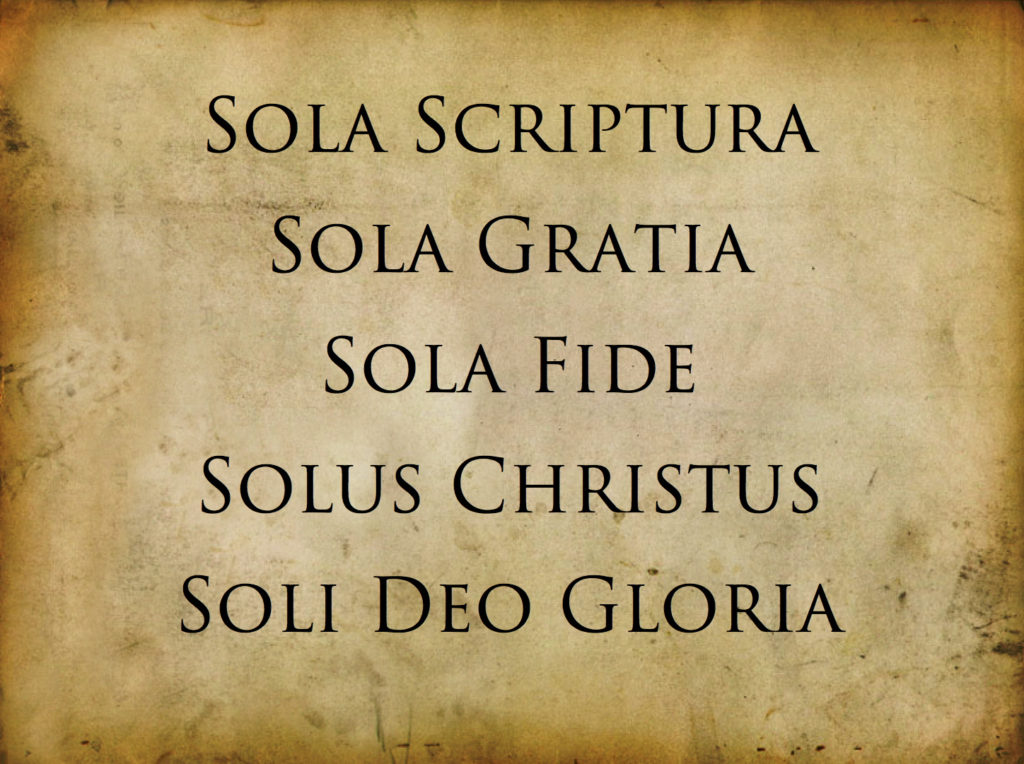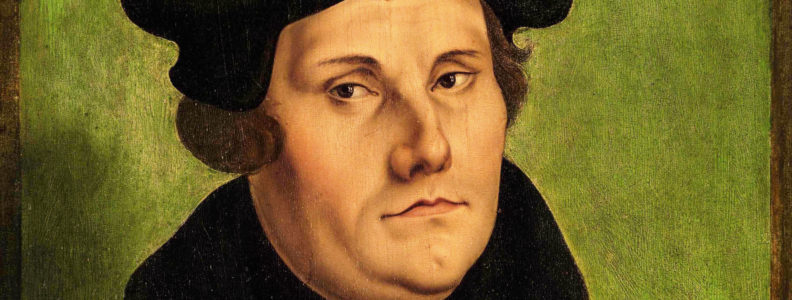Once more I repeat, if men would only study with attention the Bible and the History of the Reformation, I should have little fear of their “minds being led astray from their sincere and pure devotion to Christ.”
Last week, I began a two part series on what the reformation is and why we should care. I mentioned that the reformation came about because men like Luther, Zwingli and others wanted to address some of the false teaching within the Roman catholic church. It should be noted that Luther did not want to break away from the Catholic Church, he just wanted to reform it. He later found out that reforming the church was impossible, so he and others eventually broke away.
After the break up, the reformers saw the need to distinguish their teachings and beliefs from that of the Catholic Church. To put it in simples terms, they came up with what is known as the “Five Solas”:
1. Sola scriptura: “Scripture alone”
2. Sola fide: “faith alone”
3. Sola gratia: “grace alone”
4. Solo Christo: “Christ alone”
5. Soli Deo gloria: “to the glory of God alone”
Sola is a latin word that means “alone”. Latin was the language of their day. More on the “Five Solas” here
Last week, I shared the first of a two part series by Dr. RC Sproul on the reformation. This week, we will listen to part of the message.
False doctrine has plagued the Church since it’s inception. The NT books of Galatians and Colossians were written to address false doctrines within the Church. It is no different in our day. How do we arm ourselves against false doctrine? JC Ryle explains:
Making of the Protestant Reformation(Part 2)
by RC Sproul
For more teachings and lectures on the Reformation by Dr. R.C. Sproul, Click here

JC Ryle in his book “Warnings to the Churches” suggested two ways to arm ourselves against false teaching: First, study the Bible and second, learn the history of the reformation. He put it this way:
(1) Let us read our Bibles from beginning to end with daily diligence, and constant prayer for the teaching of the Holy Spirit, and so strive to become thoroughly familiar with their contents. Ignorance of the Bible is the root of all error, and a superficial acquaintance with it accounts for many of the sad perversions and defections of the present day.
In a hurrying age of travel and communication, I am firmly persuaded that many Christians do not give time enough to private reading of the Scriptures. I believe seriously that English people knew their Bibles better two hundred years ago than they do now. The consequence is, that they are “tossed back and forth by the waves, and blown here and there by every wind of teaching,” and fall an easy prey to the first clever teacher of error who tries to influence their minds.
I entreat my readers to remember this counsel, and take heed to their ways. It is as true now as ever, that the person who is versed in, or adheres strictly to, the text of the Bible, is the only good theologian, and that a familiarity with great Scriptures, is, as our Lord proved in the temptation, one of the best safeguards against error. Arm yourself then with the sword of the Spirit, and let your hand become used to it.
I am well aware that there is no royal road to Bible-knowledge. Without diligence and pains no one ever becomes “mighty in the Scriptures.” “Justification,” said Charles Simeon, with his characteristic quaintness, “is by faith, but knowledge of the Bible comes by works,” But of one thing I am certain: there is no labor which will be so richly repaid as laborious regular daily study of God’s Word.
(2) The second and last counsel which I venture to offer is this. “Let us make ourselves thoroughly acquainted with the history of the Reformation.” My reason for offering this counsel is my firm conviction that this highly important part of history has of late years been undeservedly neglected.
Thousands of Christians nowadays have a most inadequate notion of the amount of our debt to our martyred Reformers. They have no distinct conception of the state of darkness and superstition in which our fathers lived, and of the light and liberty which the Reformation brought in. And the consequence is that they see no great harm in the Roman Catholic movement of the present day, and have very indistinct ideas of the real nature and work of Catholicism. It is high time that a better state of things should begin.
Of one thing I am thoroughly convinced: a vast amount of the prevailing apathy about the Romanizing movement of the day may be traced up to gross ignorance, both of the true nature of Catholicism and of the Protestant Reformation. Ignorance, after all, is one of the best friends of false doctrine. More light is one of the great wants of the day, even in our century. Thousands are led astray by Catholicism or infidelity from sheer want of reading and information.
Once more I repeat, if men would only study with attention the Bible and the History of the Reformation, I should have little fear of their “minds being led astray from their sincere and pure devotion to Christ.”
Emphasis mine.
In 2017, the 500th anniversary of the reformation was celebrated by Christians all over the world. You can watch the celebration conference by ligonier ministries here :
Soli Deo Gloria!
